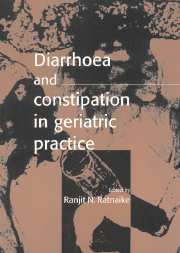Book contents
- Frontmatter
- Contents
- List of contributors
- Preface
- Acknowledgments
- Foreword by Gary R. Andrews
- I Defences of the aging gastrointestinal tract
- II Diarrhoea
- 3 Pathophysiology of diarrhoea
- 4 History and physical examination
- 5 The investigation of diarrhoea
- 6 Faecal incontinence
- 7 Drug-induced diarrhoea
- 8 Aetiology of infectious diarrhoea
- 9 Specific infectious conditions
- 10 An overview of management of infectious diarrhoea
- III Noninfectious clinical entities
- IV Constipation
- V Perspectives of altered bowel function
- Index
7 - Drug-induced diarrhoea
Published online by Cambridge University Press: 17 August 2009
- Frontmatter
- Contents
- List of contributors
- Preface
- Acknowledgments
- Foreword by Gary R. Andrews
- I Defences of the aging gastrointestinal tract
- II Diarrhoea
- 3 Pathophysiology of diarrhoea
- 4 History and physical examination
- 5 The investigation of diarrhoea
- 6 Faecal incontinence
- 7 Drug-induced diarrhoea
- 8 Aetiology of infectious diarrhoea
- 9 Specific infectious conditions
- 10 An overview of management of infectious diarrhoea
- III Noninfectious clinical entities
- IV Constipation
- V Perspectives of altered bowel function
- Index
Summary
Introduction
Diarrhoea is a problem in the elderly population where a significant and major cause is the adverse effects of drugs. Drug consumption increases with age, being highest in the elderly, affluent, white female patient, and amplifies the potential for adverse drug reactions and drug–drug interactions. In addition, the elderly patient is more likely to suffer from the adverse effects of drugs (including diarrhoea) due to blunted homeostatic mechanisms and impaired drug handling.
The elderly are an increasing portion of the total population and they consume a disproportionately large number of drugs; this disparity is in part due to the vast number of drugs now available to treat diseases associated with old age. Most drugs consumed by the elderly are for chronic conditions and therefore therapy is often for prolonged periods. It is likely that adverse effects and/or interactions, including drug-associated diarrhoea, will increase in frequency.
The number of diseases for which drug interventions are available increases with greater knowledge of the disease processes and the advent of new diagnostic tools. New classes of drugs have become available for managing myocardial ischaemia and cardiac failure, hypertension, peptic ulcer and reflux oesophagitis. These drugs include the angiotensin–converting enzyme inhibitors (ACEIs) (e.g. captopril and enalapril), HMG–CoA–reductase inhibitors (e.g. atorvastatin, pravastatin, lovostatin and simvastatin), and inhibitors of gastric acid production (e.g. ranitidine and omeprazole).
Information
- Type
- Chapter
- Information
- Diarrhoea and Constipation in Geriatric Practice , pp. 79 - 88Publisher: Cambridge University PressPrint publication year: 1999
Accessibility standard: Unknown
Why this information is here
This section outlines the accessibility features of this content - including support for screen readers, full keyboard navigation and high-contrast display options. This may not be relevant for you.Accessibility Information
- 1
- Cited by
